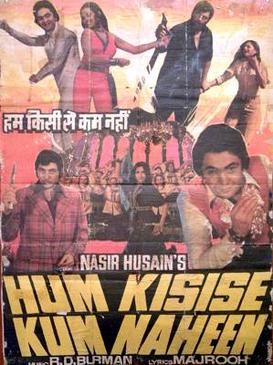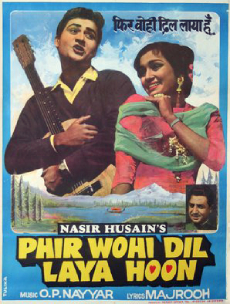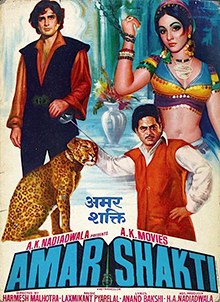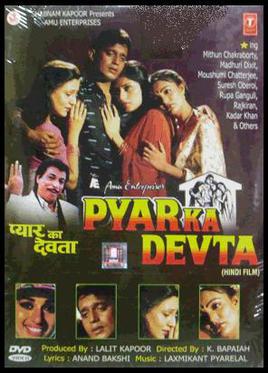
Mohammad Nasir Hussain Khan, better known as Nasir Hussain, was an Indian film producer, film director, and screenwriter. With a career spanning decades, Hussain has been credited as a major trendsetter in the history of Hindi cinema. For example, he directed Yaadon Ki Baraat (1973), which created the Hindi language masala film genre that defined Hindi cinema in the 1970s and 1980s, and he wrote and produced Qayamat Se Qayamat Tak (1988), which set the Hindi language musical romance template that defined Hindi cinema in the 1990s. Akshay Manwani wrote a book on Hussain's cinema titled Music, Masti, Modernity: The Cinema of Nasir Husain.

Teesri Manzil is a 1966 Indian musical mystery film directed by Vijay Anand and produced by Nasir Hussain. Released on 21 October 1966, the film stars Shammi Kapoor and Asha Parekh in titular roles and Helen, Premnath, Iftekhar and Prem Chopra in supporting roles.
Rajendra Nath Malhotra was an Indian actor and comedian in Hindi and Punjabi films.

Hum Kisise Kum Naheen is a 1977 Indian masala film produced and directed by Nasir Hussain. It stars Rishi Kapoor, Tariq, Kaajal Kiran, and Amjad Khan, with Zeenat Aman in a special appearance. It took the third top spot at the box office in 1977. Mohammed Rafi received his only National Film Award for this film.

Jab Pyar Kisi Se Hota Hai is a 1961 Hindi-language musical comedy film that became a box office hit. It was written, produced, and directed by Nasir Hussain. The first film Hussain ever produced, it featured Dev Anand and Hussain fixture Asha Parekh in the leading roles. Pran played the villain in the film and Rajindernath starred in a supporting role.

Phir Wohi Dil Laya Hoon is a 1963 Indian Hindi-language film. The film became superhit at the box office. This was Nasir Hussain's second production, after the hit film Jab Pyar Kisi Se Hota Hai (1961). He also wrote and directed it. It starred Joy Mukherjee and the Nasir Hussain fixture Asha Parekh. Pran played the villain in the film and Rajindernath had a supporting role. It also contains many songs that Mohammed Rafi sang beautifully.

Tumsa Nahin Dekha is a 1957 Indian Hindi language romance drama film, produced by Sashadhar Mukherjee while written and directed by Nasir Hussain, of Filmistan Pvt. Ltd. The film marked Hussain's evolution into a director. He had written films such as Munimji and Paying Guest.

Dharam Karam is a 1975 Hindi drama film produced by Raj Kapoor and directed by Randhir Kapoor, who also stars as father and son in the film, respectively. The film also stars Rekha, Premnath and Dara Singh. The music is by R.D. Burman and the lyrics by Majrooh Sultanpuri, who received a Filmfare nomination as Best Lyricist for the hit song "Ek Din Bik Jayega." The song is played 4 times during the film, with playback singing by Kishore Kumar, Mukesh and Sushma Shrestha. Of the three of them, only Mukesh received a Filmfare nomination as Best Male Playback Singer for the song. According to one source, the film performed "Below Average" at the box office.

Abhinetri is a 1970 Indian Hindi film produced and directed by Subodh Mukherjee. The film stars Shashi Kapoor, Hema Malini, Nirupa Roy, Nazima, Asit Sen and Deb Mukherjee. The music composed by Laxmikant Pyarelal includes the song "Sa Re Ga Ma Pa" by Lata Mangeshkar and Kishore Kumar, besides the hit Lata Mangeshkar solo "O Ghata Sanwari".

Doosra Aadmi is a 1977 Hindi-language romantic drama film, produced by Yash Chopra and directed by Ramesh Talwar. The film stars Raakhee, Rishi Kapoor, Neetu Singh and Shashi Kapoor. The film's music is by Rajesh Roshan.
Shabbir Kumar is an Indian playback singer, notable for his work in Bollywood. Known for his sweet and resonant voice, Shabbir Kumar is an ardent fan of Mohammed Rafi. Artists with whom he has worked include Dharmendra, Jeetendra, Rishi Kapoor, Mithun Chakraborty, Amitabh Bachchan, Sunny Deol, Sanjay Dutt, Jackie Shroff, Anil Kapoor, Govinda, Chunky Pandey.

Amar Shakti is a 1978 Hindi film produced and directed by Harmesh Malhotra. It stars Shashi Kapoor, Shatrughan Sinha, Sulakshana Pandit and Manjula in lead roles.

Pyar Ka Devta is a 1991 Indian Hindi-language film directed by K. Bapayya. It stars Mithun Chakraborty and Madhuri Dixit in lead roles.

Daata (transl. Giver) is a 1989 Indian Hindi-language action drama film directed and produced by Sultan Ahmed. The film stars Shammi Kapoor, Mithun Chakraborty, Padmini Kolhapure, Suresh Oberoi, Prem Chopra, Ranjeet, Amrish Puri in pivotal roles. The film was a big hit.

Kala Dhanda Goray Log is a 1986 hit Hindi-language action thriller film directed by Sanjay Khan, starring Sunil Dutt, Sanjay Khan, Anita Raj, Akbar Khan and Amrita Singh. The film's music was by Louis Banks and Laxmikant–Pyarelal, while the lyrics were by Anand Bakshi. The film was shot Chandivali Studio and Film City in Mumbai. This was Khan's last film, before shifting to television, acting and directing TV series like The Sword of Tipu Sultan (1990). The title of film became a popular phrase regarding corruption in high places.

Gangaa Jamunaa Saraswathi is 1988 Indian Hindi-language romantic action film directed by Manmohan Desai, produced by S. Ramanathan and starring Amitabh Bachchan as Ganga, Meenakshi Sheshadri as Jamuna, Jaya Prada as Saraswati. Supporting cast includes Mithun Chakraborty, Nirupa Roy, Amrish Puri.

Telephone / Telecom Advisory Committees (TAC) is a high level Indian government body made up of members of parliament and other members nominated by the Ministry of Communications and Information Technology to address issues concerning telecommunication in India. Looked upon as a privileged panel, the Telephone Advisory Committees, constituted by the Ministry of Communications and Information Technology (India) of the Government of India to serve as a vital feedback mechanism for improvement of services in the Telecommunications sector by the Department of Telecommunications















